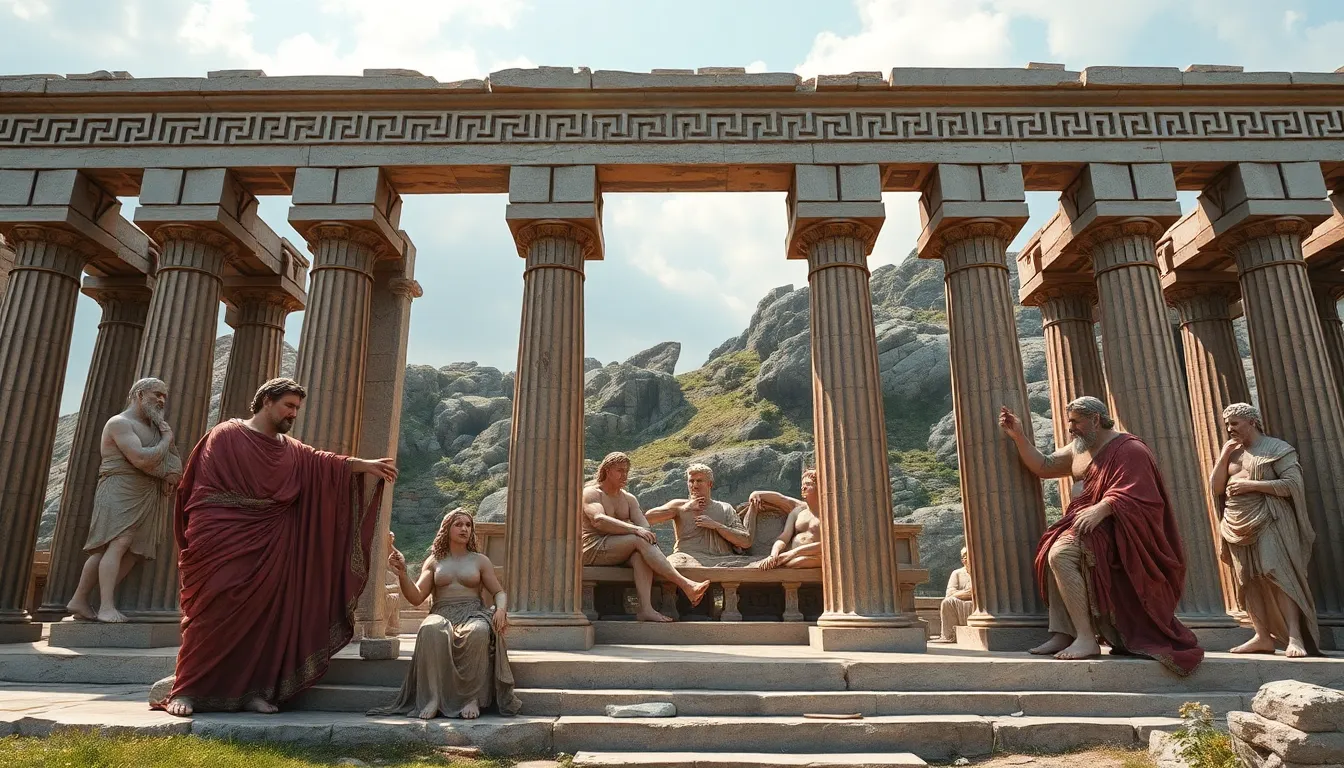The Significance of Creation Myths in Greek Religion
I. Introduction
Creation myths are foundational narratives that explain the origins of the universe, humanity, and the gods. In Greek religion, these myths are not merely stories but are integral to understanding the beliefs, values, and the cosmological framework of ancient Greek society. The Greek pantheon, rich with deities and mythical figures, serves as a backdrop for these narratives, illustrating the complexities of divine interactions and human existence.
By studying Greek creation myths, we gain insight into the ancient Greek worldview, their understanding of nature, and their approach to life and morality. These myths reflect the cultural ethos, societal norms, and philosophical inquiries of the time, making them significant not only in a religious context but also in a broader cultural sense.
II. Historical Context of Greek Creation Myths
The origins of creation myths in ancient Greece can be traced back to a time when oral traditions were predominant. These myths were passed down through generations, evolving with each retelling, until they were eventually recorded in texts such as Hesiod’s “Theogony” in the 8th century BCE.
The influence of oral tradition is evident in the fluidity of these narratives, which often adapted to reflect the changing values and circumstances of Greek society. Furthermore, when compared to creation myths from other cultures, such as the Babylonian Enuma Elish or the Hebrew Genesis, Greek myths often emphasize a pantheon of gods with distinct personalities and conflicts, highlighting the Greeks’ unique perspective on divinity and morality.
III. Major Creation Myths in Greek Religion
One of the most significant texts detailing Greek creation myths is Hesiod’s “Theogony,” which outlines the genealogies of the gods and the origins of the cosmos. In this work, several key figures emerge:
- Chaos: The primordial void that existed before anything else.
- Gaia: The Earth, who emerged from Chaos and became the mother of all.
- Tartarus: The abyss that serves as a dungeon of torment.
- Eros: The embodiment of love and desire, often seen as a creative force.
From Chaos, Gaia gave birth to Uranus (the sky), and together they produced the Titans, who later played crucial roles in the mythology surrounding the rise of the Olympian gods. The birth of the Olympians, including Zeus, Hera, Poseidon, and others, marks a significant shift in power dynamics among the gods and reflects themes of conflict, succession, and the establishment of order.
IV. Symbolism and Themes in Creation Myths
Greek creation myths are rich in symbolism and explore various themes that resonate throughout their mythology:
- Chaos and Order: The transition from Chaos to a structured cosmos symbolizes the duality of creation, where disorder gives way to harmony.
- Gender Roles: The depiction of divine femininity, particularly through figures like Gaia and Hera, illustrates the complexities of gender in ancient Greek society.
- Gods and Humanity: The relationship between gods and humans is a recurring theme, emphasizing both the divine influence on human affairs and the moral obligations of humanity towards the gods.
V. The Role of Creation Myths in Greek Cosmology
Creation myths serve as a framework for Greek cosmology, providing explanations for the universe’s origins and the roles of various deities. These narratives help in understanding the structure of the universe as perceived by the Greeks, where gods personified natural elements and forces.
Moreover, these myths impacted Greek philosophical thought by inspiring inquiries into the nature of existence, the concept of an ordered universe, and humanity’s place within it. Philosophers like Plato and Aristotle drew upon these myths to discuss metaphysical ideas, ethics, and the nature of reality.
VI. Creation Myths and Their Influence on Greek Society
The significance of creation myths extends beyond religious texts; they reflect societal values and norms of ancient Greece. These myths were often recited during rituals and religious practices, reinforcing the cultural identity of the community.
Additionally, the themes found in creation myths permeated art and literature, influencing works from classical tragedies to modern interpretations. Education in ancient Greece also included the study of these myths, shaping the moral and ethical frameworks of young citizens.
VII. Modern Interpretations and Relevance
Contemporary scholars approach Greek creation myths with a focus on their psychological, social, and cultural implications. They explore how these ancient narratives resonate with modern themes of identity, morality, and the human experience.
Furthermore, the influence of Greek creation myths can be seen in modern literature, art, and psychology. Concepts such as archetypes, drawn from figures in these myths, inform psychological theories, particularly in the works of Carl Jung. The enduring legacy of these myths continues to capture the imagination of popular culture, inspiring films, novels, and other artistic expressions.
VIII. Conclusion
In summary, creation myths hold significant importance in Greek religion, providing insights into the beliefs and values of ancient Greek society. They serve as foundational narratives that shaped the understanding of the cosmos, the divine, and humanity’s role within it.
These myths not only influenced ancient practices and philosophical thought but also continue to resonate in modern interpretations and cultural expressions. Exploring Greek mythology opens a window into the complexities of human existence and our enduring quest for meaning.
For those intrigued by these themes, further exploration of Greek mythology reveals a rich tapestry of stories that continue to inspire and provoke thought across generations.




